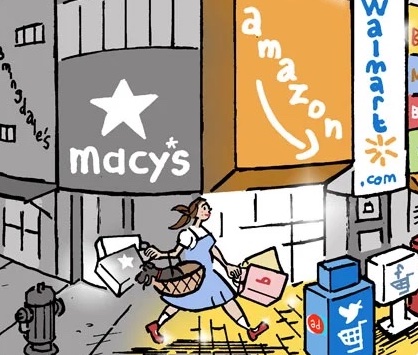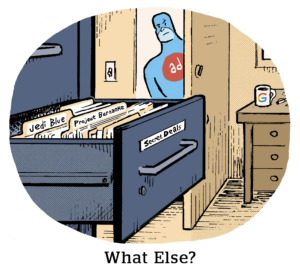Here’s today’s AdExchanger.com news round-up… Want it by email? Sign up here.
Retail’s Tail Wags The Dog
One thing retailers love about the advertising business is that they can increase their profit margins while also providing beneficial knock-on effects for other parts of the company.
Walmart recently reported earnings and emphasized that the growth of Walmart Connect, its ads business, is separate from the growth of its third-party marketplace (an Amazon-esque site that carries hundreds of thousands of items not sold in Walmart stores) and from its Walmart+ subscription package.
But those businesses also generate cumulative scale.
Likewise, Target reported earnings yesterday, and while it only discloses ad revenue once per year in an annual wrap-up after Q1, leadership highlighted Roundel as a standalone revenue channel and as a growth driver for other elements of the business.
For example, Roundel helped create growth for Target Circle, its membership program, which in turn led to a 4X increase in the total number of personalized offers Target was able to extend to shoppers.
“And of course, those same insights fuel our Roundel media network,” Rick Gomez, Target’s EVP and chief commercial officer, told investors, “which continues to benefit our business in multiple ways.”
They Put It In A Gmail
Two weeks ago, the Financial Times reported that a Meta campaign on YouTube had been called off when it was discovered that Google salespeople were skirting Google’s own rules for targeting teens.
The workaround involves Google classifying users who aren’t logged in or who have rejected personalized ads as “unknown.” While technically true, Google knows full well that a disproportionate number of those viewers are teenagers. This is a way, using a legalistic twist of words, to target and personalize ads for teens without actually targeting teens.
Well, anyway, turns out this tactic wasn’t just a one-off for a Meta campaign. Adweek reports Google has been making hay of this method to target teens for other advertisers even after the FT’s report.
A Google spokesperson defends its “unknown” classification, and it doesn’t seem like that internal taxonomy will change. What will stop, however, is Google’s sales people putting this tactic into writing.
The rules and technical protections that prevent targeting under-18s “continue to work properly,” the Google spox tells Adweek. “We will be taking additional action with sales representatives to reinforce that they must not help agencies or advertisers attempt to circumvent our policies.”
Creepy Crawlers
Speaking of Google and Meta, both companies sneakily introduced new AI web crawlers within the past month.
Search Engine Journal reports that the Google-CloudVertexBot is now scraping website content for Vertex AI clients, although it’s unclear whether it’s indexing public website data.
Meanwhile, Meta’s got not one but two bots soaking up data, according to Business Insider. The Meta-ExternalAgent bot directly indexes content for its training AI models, whereas Meta-ExternalFetcher collects links to support specific elements of Meta’s AI assistant products.
What this means for publishers is that they’ll need to update or install new blockers if they want to shield their content from web scrapers.
Easier said than done, of course.
According to Meta, the ExternalFetcher bot “may bypass robots.txt rules,” which have been used to prevent unwanted web scraping since the late ’90s (and which are routinely ignored by other AI companies, too).
There’s also the added snag that blocking Google or Meta might affect web traffic. For publishers that rely on search and social traffic but don’t want to be plagiarized, it’s a real “damned if you do, damned if you don’t” situation.
But Wait, There’s More!
Is Reddit getting ready to launch its own search ads business? [Digiday]
The UK’s antitrust watchdog has closed its investigations into Google’s Play Store and Apple’s App Store – but plans to keep on looking into Big Tech under the EU’s Digital Markets Act. [WSJ]
And speaking of Big Tech regulation, the EU expects its Digital Markets Act and Digital Services Act to reach every corner of the digital ecosystem. [Fortune]
Brian Wieser on commerce media’s deceleration. [Madison and Wall]
Chick-fil-A is launching its own streaming service with original content. [Deadline]
Harley Davidson is the latest brand to publicly drop its DEI initiatives – including supplier diversity spend goals – in response to conservative pressure campaigns. [CNN]















